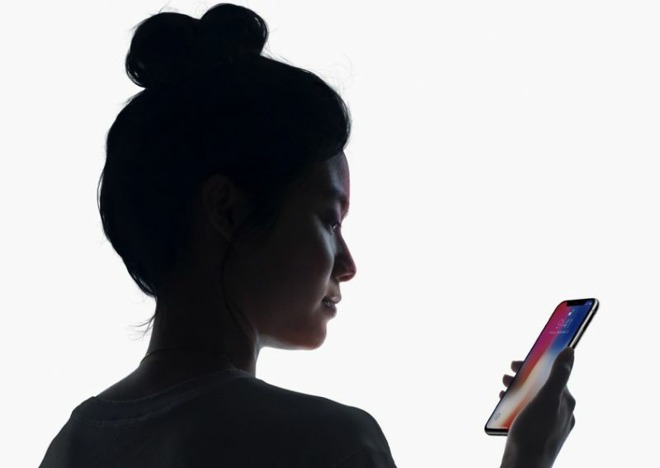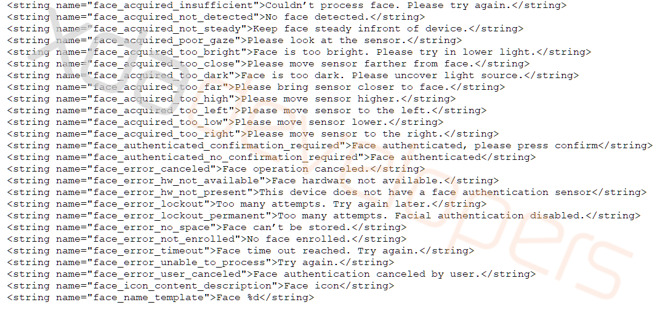Google's upcoming Android Q might include support for Face ID-like authentication
According to leaked code, Google appears set to implement native support for advanced facial recognition sensors in the upcoming Android Q update that, like Face ID, can be used to unlock a device and make purchases.

The code, obtained by XDA Developers, has "dozens of strings and multiple methods, classes, and fields" strewn about that all reference facial recognition.
Distinct from the existing 2D-based "Trusted Face" feature, the "face unlock" functionality discovered in the leaked ASOP build of Android Q references error messages that suggest the operating system expects a device to incorporate facial recognition sensors similar to Apple's TrueDepth camera system. For example, one error message reads, "Face hardware not available."
Following Apple's debut of Face ID, Android handset makers scrambled to roll out their own 3D-sensing solutions. While some, like Huawei and Xiaomi, have successfully incorporated the specialized hardware into their devices, these implementations rely on heavily modified versions of Android to accomplish the feat. By adding support natively into the OS, more manufacturers will be able to take advantage of the technology in upcoming handsets and tablets.

Android Q facial recognition code | XDA Developers
The Android implementations so far are mostly playing catch-up to Apple, and have been frequently fooled by photos or masks.
Android Q's version of facial recognition is poised to be much more secure, suitable for unlocking the phone, accessing apps, or authenticating purchases, similar to Face ID.
Apple's depth-sensing system uses structured light from a dot projector to determine the 3D structure of a user's face. TrueDepth projects an array of 30,000 dots in a known pattern using a vertical-cavity surface-emitting laser (VCSEL) module, then processes and compares the resulting image against secure reference data.
While certain Android manufacturers currently rely on sensors similar to TrueDepth, it is anticipated that many will turn to cheaper and smaller modules based on time-of-flight technology. ToF sensors generate depth maps by calculating the time it takes laser pulses or modulated laser light to bounce off an object's surface.

Android Q facial recognition code | XDA Developers
Additional code was found highlights error messages that are shown when the sensor is unable to correctly identify a face.
Google is expected to debut Android Q this upcoming May at its annual developer's conference.

The code, obtained by XDA Developers, has "dozens of strings and multiple methods, classes, and fields" strewn about that all reference facial recognition.
Distinct from the existing 2D-based "Trusted Face" feature, the "face unlock" functionality discovered in the leaked ASOP build of Android Q references error messages that suggest the operating system expects a device to incorporate facial recognition sensors similar to Apple's TrueDepth camera system. For example, one error message reads, "Face hardware not available."
Following Apple's debut of Face ID, Android handset makers scrambled to roll out their own 3D-sensing solutions. While some, like Huawei and Xiaomi, have successfully incorporated the specialized hardware into their devices, these implementations rely on heavily modified versions of Android to accomplish the feat. By adding support natively into the OS, more manufacturers will be able to take advantage of the technology in upcoming handsets and tablets.

Android Q facial recognition code | XDA Developers
The Android implementations so far are mostly playing catch-up to Apple, and have been frequently fooled by photos or masks.
Android Q's version of facial recognition is poised to be much more secure, suitable for unlocking the phone, accessing apps, or authenticating purchases, similar to Face ID.
Apple's depth-sensing system uses structured light from a dot projector to determine the 3D structure of a user's face. TrueDepth projects an array of 30,000 dots in a known pattern using a vertical-cavity surface-emitting laser (VCSEL) module, then processes and compares the resulting image against secure reference data.
While certain Android manufacturers currently rely on sensors similar to TrueDepth, it is anticipated that many will turn to cheaper and smaller modules based on time-of-flight technology. ToF sensors generate depth maps by calculating the time it takes laser pulses or modulated laser light to bounce off an object's surface.

Android Q facial recognition code | XDA Developers
Additional code was found highlights error messages that are shown when the sensor is unable to correctly identify a face.
Google is expected to debut Android Q this upcoming May at its annual developer's conference.

Comments
AppleInsider is usually pretty good though.
Apple is the only one playing catch-up.
Apple is the only one not innovating.
Apple is the only one that is constantly doomed.
Apple is unique that way!!
Just a matter of weeks after the launch of iPhone X, and taking advantage of the presentation of one of its phones, Honor demoed its owned solution. It wasn't some hastily cobbled together copy of what Apple had revealed but a full overview of what they were working on, including ten times the resolution of what Apple was offering (sub mm precision) and 3D small object recognition.
The other part of Apple's Face ID was tied to what is now known as 'contextual computing'. Again, Honor had implemented that long before Apple and even resolved issues that the iPhone X didn't (the ability for the phone to override the orientation settings when the user was looking at the phone from a horizontal position, for example). They used eyetracking to turn off the screen for power saving etc.
The 'problem' was that these solutions were convenience features and not security features and as such could not be used for authentication purposes. For that, more secure biometrics were necessary and fingerprint sensors were perfect for the task. Fast, reliable and above all, cheap.
The Face ID-like 3D depth sensing options were there but only for two manufacturers: Apple and Huawei.
That was because of the NPU functionality.
There was another issue: cost.
Honor would later reveal (January 2018) that including their solution would have made the phones too expensive. Remember they already had secure authentication and contextual computing covered. There was no pressing need to include 3D depth sensing for biometrics especially as they were often putting fingerprint sensors on the back of phones anyway and could still reduce bezels (again, ahead of Apple) as a result.
Apple didn't really have the same options open to it but was faced with the same cost problems. This was a problem as they only released two phones per year. It would have been very risky to make one of the two much more expensive. They opted to include a third phone to the lineup and limit FaceID to that one phone.
Although some 'analysts' had claimed Android hardware was at least two years behind Apple on Face ID (a very strange assumption given the Honor claims and demo) Huawei duly released its own solution in late 2018 and took things one step further than Apple by including its first stab at 3D object modelling (the 3D panda demo raising eyebrows at the presentation of the Mate 20 Pro). Apple has basically not changed much with regards to Face ID from 2017 to 2018. Speed has improved due to the A12 but it still seems limited to biometrics.
The ToF systems coming to Android handsets appear to be focussed on the rear facing array. Rumours are pointing to AR/VR uses rather than biometric uses.
Feels bad for the users of the 3 phones that will have this.
Imagine waking up early and ugly, then you get ads for toothpaste, make up, hair brushes etc.